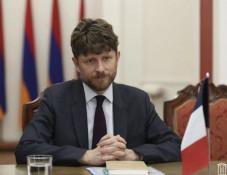
Media reports: Power and economy in Azerbaijan are completely dominated by one foreign company – BP
Campaign group Platform London has attacked the oil firm in a new book, criticizing the oil company British Petroleum, the sponsorship of the 2015 European Games in Baku and the relationship the company has with the Azerbaijani regime, responsible for jailing various journalists and activists, an article published in the Blue and Green Tomorrow reads.
In the book named All that Glitters – Sport, BP and Repression in Azerbaijan, Platform explored the links between BP – the largest foreign investor in Azerbaijan – and President Aliyev, criticised for human rights abuse and lack of freedom of speech. The book argues that BP has had a central role in empowering the Aliyev dynasty and its relationship with the US and the EU, and in shaping the sport event, nicknamed ‘Oil Games’, in order to serve its interests. This is despite several controversial power abuses, including the arrests of various journalists, academics and activists in the country, who speak out against the government and BP, according to the article.
It further reads that journalist Khadija Ismayilova who was imprisoned in December 2014 said before the arrest, “BP bear a responsibility for what is happening in Azerbaijan. BP is one of the reasons why the west is very hesitant about any changes in this country. The Aliyev regime is good for BP. It allows their operations and they can sort out issues with the regime. Political influence is part of the bargain. BP is blamed for bringing Aliyev senior to power but it’s not just historic – the UK government is silent about problems with democracy in Azerbaijan. BP’s interests are dictating the agenda.”
According to Blue and Green Tomorrow, BP says on its website that its operations in the region have “stimulated social and economic progress.” Nevertheless, earlier this year, the firm cut 255 jobs in Azerbaijan – around 8% of its workforce.
Libcom.org reports that a protest against Azerbaijan’s crackdown on political dissent will be staged in London on 12 June, as the first European Games open in Baku. At least 33 human rights defenders, youth movement activists, bloggers, journalists and others have been jailed in the last year in Azerbaijan – where the UK-based oil group BP is the largest foreign investor. Campaign groups and media have been shut down, and dissidents forced to leave the country.
Despite international criticism, the regime has stepped up repression as next week’s games have drawn nearer. Rasul Jafarov, who organised “Art for Democracy” protest campaign, was sentenced to six and a half years in jail on 16 April, the same day that BP held its annual shareholders’ meeting in London. On June 12 demonstrators in London will go to the corporate headquarters of BP. It’s an excellent choice: there can not be many economies so completely dominated by one foreign company as Azerbaijan’s is by BP, the author writes.
He notes that oil and gas account for 95% of Azerbaijani exports, 75% of the government’s income and 40% of the whole economy (as measured by Gross Domestic Product (GDP)) – and BP operate the largest oil project, the Azeri-Chirag-Guneshli (ACG) field; the largest gas project, the Shah Deniz field; has investments in oil and gas processing; and took the lead in building the Baku-Tbilisi-Ceyhan pipeline that pumps Azerbaijani oil to the Mediterranean. In partnership with the Azerbaijani national oil and gas company, Socar, BP is now building pipelines to bring gas to Europe.
The British government played a key part in opening Azerbaijan up for BP. In 1992, as BP battled with US oil companies to scoop up deals in the former Soviet Union, foreign office officials even flew former Prime Minister Margaret Thatcher to Baku to help seal the deal on ACG. In the mid 2000s, when oil prices were high and the Baku elite was getting rich, BP often boasted of its role in the boom. But now that’s over. Social tensions and protest movements are very likely to grow this year, as the sharp fall in oil prices has shaken the economy and state finances, the author of the article highlights.
He notes that the devaluation by one third of the national currency, the manat, in March was a big shock. More than 10,000 people turned out in Baku when a moderate opposition coalition staged a legal protest against cuts in living standards and rising prices, Index on Censorship reported. There may be worse to come for ordinary Azerbaijanis. The effect of lower oil prices (which are wreaking havoc on many oil producing countries’ economies) is combined with the effects of the natural decline in oil production (the biggest and easiest-to-reach deposits have been used up, meaning that the fall in revenue will be permanent).
“Oil production hit its peak in 2010, then fell by almost 15% in three years – from 50.8 million tonnes in 2010 to 43.4 million tonnes in 2013 – and is still falling. The country may soon have ‘serious problems’ producing even 40 million tonnes per year, because the oil companies now have to drill deeper to find new deposits,” the Baku-based Centre for Economic and Social Development said in December, according to the article.
As it is further said in the article, Azerbaijani government officials have claimed that natural gas can make up for the decline in oil revenues. But they are exaggerating. There is a significant new gas project – the second phase of the Shah Deniz field, operated by BP. But once you count up the huge infrastructure costs (in particular, for pipelines to take the gas to Turkey and south-eastern Europe), and the likelihood that low gas prices will persist right into the 2020s, the benefit to the Azerbaijani elite looks minimal compared to what they made from the now-receding oil boom.
According to the article, the International Monetary Fund warned in a report in 2013 that oil reserves “could be depleted in 15-20 years. Despite anticipated increases in gas production, gas revenues are unlikely to help offset the oil revenue decline due to price differentials and rapid changes in gas markets.” In 2013, the government set the budget assuming they were getting $100/barrel for oil. For 2015, they have assumed an average $90/barrel oil price – but the pundits expect it to be more like $60.
In February, Azerbaijan’s Central Bank devalued the manat. “Stunned” savers queued for hours to withdraw their money from banks. “Budget cuts are ‘unavoidable.’ The government could survive low oil prices for a year or two without serious risks to social stability – because it has $37 billion in its rainy-day oil fund. But if low oil prices persist after that, living standards are likely to fall sharply,” the author cites Eurasia.net.
As the article has it, the sense that the party is over, and that the elite has eaten most of the cake, is surely widespread. One gloomy thought is that the elite could stoke up its “frozen conflict” with Armenia – over the disputed territory of Nagorno Karabakh – to divert attention from its domestic problems. Twenty thousand people were killed in 1992-94, and about a million turned into refugees, after Armenia, with Russian support, occupied the mainly Armenian-speaking enclave. In the 20 years since the “hot” war ended, fire has routinely been exchanged on the front line but casualties have been counted in dozens per year. In 2014, they went up to 60: “it’s not just snipers any more. It’s attack helicopters, artillery and more,” the Financial Times reported, according to the article.
On 12-28 June, Baku will host the first European Games under the auspices of the European Olympic Committee. According to media estimates, the Games will cost the Azerbaijani population $10 billion. However, they have become a serious headache for the locals with numerous bans and demolition of property. The preparatory works for the Games are accompanied by crackdowns and brutal repressions against dissent.
Related:
The Guardian: EOC's stance about disastrous situation in Azerbaijan is pathetic
Newsfeed
Videos






























